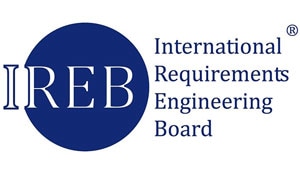Requirements Management
Register now
About the training
Requirements need to be managed efficiently and reliably over the entire lifecycle of a project and that of the resulting product. Such management begins with structuring requirements within a repository, continues with the use of attributes, setting the right priorities and version and change management, and in the end also involves tracking changes. In this course, you‘ll learn the methods and tools you can use to bring about efficient requirements management.
Certification- IREB® CPRE Advanced Level
The seminar is based on the IREB® syllabus and prepares you to take the exam to become an IREB® Certified Professional for Requirements Engineering. The certification exam is given as an e-exam, and you may choose the date on which you take it. To prepare you for the certification exam, our Web App is available with detailed learning and exam questions.
Target Group
analysts, requirements engineers, project managers, product managers, quality managers
Prerequisite
IREB® CPRE Requirements Engineering – Foundation Level
Content
Introduction to the problem of requirements management
- Definition of requirements management
- Tasks in requirements management
- Goals and benefits of requirements management
- Relevant standards
Information structure models for requirements
- Facets of a requirements landscape
- Requirement types
- Requirement artifacts
- Form of documentation
- Levels of abstraction for requirements
- Requirements information model
Defining and using attributes and views
- Using attributes in requirements management
- Using attribute schemas
- Designing an attribute schema
- Goals and types of views
- Defining views and risks involved in views
- Optimizing attribution and view modeling
Evaluating and prioritizing requirements
- Fundamental principles of evaluation
- Prioritizing requirements
- Ad hoc prioritization techniques
- Two-criteria classification
- 100-dollar technique
- Analytical prioritization techniques
- Combining prioritization techniques
Version and change management for requirements
- Versioning requirements
- Version control for requirements and requirements documents
- Requirement configurations
- Requirement baselines
- Branching requirements
- Change management for requirements
- Reasons for, sources of and times for requirement changes
- Types of requirement changes
- Analysis and documentation of requirement stability
- Change management process
Traceability of requirements
- Definition of and reasons for requirement traceability
- Defining traceability
- Reasons for requirement traceability
- Various considerations in the area of traceability
- Different relationship types and forms for representing traceability relationships
- Types of traceability relationships
- Bidirectional and unidirectional traceability relationships
- Forms for representing traceability relationships
- Developing project-specific strategies
- Evaluating traceability concepts
- Traceability of non-textual artifacts
Variant management of requirements
- Use of variants for requirements
- Forming explicit documentation of variants and their evaluation
- Feature modeling
Efficient reporting in requirements management
- Reporting goals and benefits
- Establishing a system of reporting
- Interfaces
- Content of a report
- Challenges in applying reporting systems
- Report definition process
- Performance indicators in requirements engineering
- Performance indicators in requirements management
- Using the goal/question/metric method to derive performance indicators
- Risks and problems in applying reporting systems
Managing requirements engineering processes
- Requirements engineering as a process
- Parameters of the requirements engineering process
- Documenting the requirements engineering process
- Monitoring and controlling the requirements engineering process
- Structural improvement of the requirements engineering process
Requirements management in agile projects
- Agile methods
- Requirements management in agile projects
- Mapping RM activities to Scrum activities
Use of tools in requirements management
- Role of tools in requirements management
- Principal approaches to tool selection
- Exchanging data between RM tools
Notes
The CPRE certification exam will be offered after the training as an E-Exam at a date of your choice. It consists of a multiple choice test and a written assignment. There is an extra fee for the certification exam – you can find information about the examination modalities and fees on our certification overview page.
Are you looking for more?
We offer you this course as an inhouse training for your company. Here you can learn more about our service packages. Tell us more about your needs, so that we can tailor an offer that perfectly fits your requirements.
We offer this course also on several dates as a webinar and face-to-face training in German. You can find all upcoming dates for our open trainings in German on our Website.


